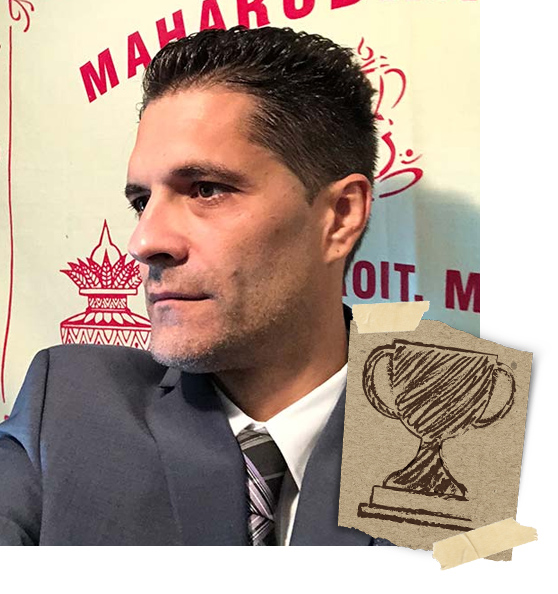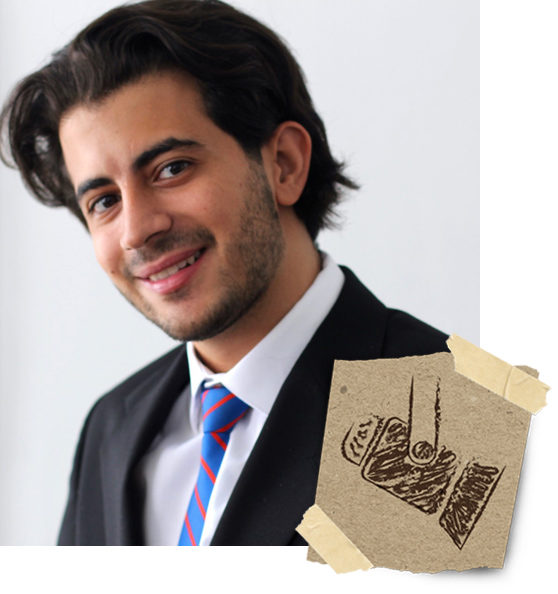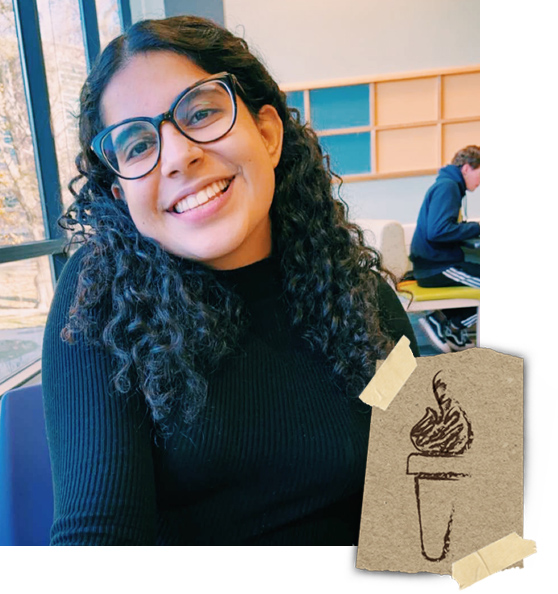Diversity Champion: Dr. Eric Montgomery
December 15, 2021 - College of Social Science
 Dr. Eric Montgomery is an assistant professor with the MSU Department of Anthropology, as well as an advisor for Peace and Justice studies and a part-time faculty member at Wayne State University. A scholar, author, teacher, and filmmaker, Dr. Montgomery is devoted to using his voice to speak up for human rights around the world.
Dr. Eric Montgomery is an assistant professor with the MSU Department of Anthropology, as well as an advisor for Peace and Justice studies and a part-time faculty member at Wayne State University. A scholar, author, teacher, and filmmaker, Dr. Montgomery is devoted to using his voice to speak up for human rights around the world.
After joining MSU's faculty in 2019, Dr. Montgomery has played an instrumental role in opening students' eyes to new ideas and narratives. One way he has done this is by bringing experts to campus to help connect students to current human rights issues.
I absolutely love getting the chance to work with students. After losing my father this semester, one of my classes not only put together a presentation thanking me for teaching them, but also sent me flowers that are now sitting in my Baker Hall office. That was really sweet.
Besides that, major highlights of mine have been working with Peace and Justice studies director Beth Drexler to bring two really inspiring speakers to campus. First was Alice J. Johnson, who was trafficked for over 25 years by the Mexican mafia from the time she was 14, and she wrote a book about her experiences in human trafficking called "Out of the Darkness." When she got to campus, I remember seeing her break down and cry because all of the opportunities that students have at Michigan State were taken away from her, because she never even had a chance to finish high school. And so while that was extremely sad, it was a highlight for me to see how much her story resonated with students and how much empathy they had for her.
Another highlight was bringing world-renowned photographer and my friend Indrani Pal-Chaudhuri onto campus to talk to students about how to craft public service announcements about social justice movements in late 2019. Indrani is a really famous celebrity photographer and has shot Beyonce, David Bowie, and Lady Gaga, but when she came to speak to the students, her focus was on the pros and cons of celebrity humanitarianism. And the public service announcements that students constructed in this class after hearing from her were just absolutely brilliant.
Dr. Montgomery has designed multiple classes for both MSU and WSU, and is focused on providing students with the knowledge they need to tackle the world's most pressing issues. Of all the classes he teachers, his favorite focuses on social justice movements from around the globe.
Without a doubt, my favorite class to teach is Anthropology 321: Social Movements. In the last few years, we've had the largest women's protests in the history of this country, as well as Black Lives Matter demonstrations that spread across the world. These movements have shook the world, and as a result, the young adults that come into my class are already social justice warriors. It's amazing to see how hungry these young adults are to make a difference in the world. So the reason why it's my favorite class to teach is because I can harness their energy, help them rein it in and focus, and show them how to really invoke change. And that's why it's my favorite class to teach.
For the final class, I split the students into 10 groups, and had each work on a current social movement. For example, one group looked at environmental justice, which included everything from overfishing to Indigenous land rights. Another group worked on March For Our Lives and the issue of gun control, just as the tragedy in Oxford took place. Everything is really poignant, and that's what I like about teaching that class.
When he's not teaching, Dr. Montgomery is also a researcher with broad interests in anthropology, religion and peace and justice. Below, he shares two of his most recent projects that he is incredibly proud of.
The vast majority of my research circulates around anthropology and religion in Western Africa, as well as voodoo in places like Haiti. My newest book which will come out in 2022, "Spirit Service: Vodún and Vodou in the African Atlantic World," published by Indiana University Press is one of the most elaborate, comprehensive, eclectic books ever written on vodou. We have experts from all around the world talking about vodou in New Orleans, Haiti and Western Africa, and how it's tied to things like personhood, identity, and unity of Black people around the world. Oftentimes, people don't realize that Vodou is the oldest and one of the largest religions on earth.
I'm also currently working on a book with Beth Drexler and Indrani Pal-Chaudhur about how to get young adults engaged in social justice through digital storytelling and social media. In today's day and age, we have to understand the impact that social media has and the way it has framed social justice issues for our youngest generation. This book will be formatted as a textbook for educators who want to teach this topic in the classroom, and is informed by students' interests and preferences.
With his passion for human rights, Dr. Montgomery understands the importance of connecting with others - even if that means learning to navigate a new virtual world.
Happiness is the intersection between doing what you're good at, what you love, and what the world needs. In my case, I'm good at teaching topics such as peace and conflict studies and anthropology; I love doing it, and the world needs it. We need more cultural relativity despite our differences, and the only way we're ever going to deal with these colossal cosmic issues like climate change and institutionalized racism is to get out of our echo chambers and hang out with people who have different political beliefs, religious beliefs and life experiences due to age, race, background, et cetera. Otherwise, we're doomed. There's an old African proverb that says, "God gave us two ears and one mouth so that we can listen twice and talk once."
Getting connected with other human beings who are different from us is easier today than ever before because of social media, which makes human rights work a lot more accessible. If you're not savvy with social media and meeting people in digital spaces, the impact that you have and the amount of knowledge that you can gain are really limited. For example, a lot of my research is focused on vodou in Africa. Twenty years ago, I had to travel there in person to do research, which was hard. But now, even though they have no electricity in the village I'm working with, I can still talk to them on WhatsApp and even FaceTime them! Time and space have been compressed exponentially in our current postmodern world. And as much as that can be scary, it is also exciting because it gives us the chance to make enormous change in a short amount of time if we are strategic.
In honor of Human Rights Awareness Month, Dr. Montgomery shares what he thinks are the three most pressing human rights issues of our time.
The first issue demanding immediate attention is genocide and ethnic cleansing. After the Holocaust, the world said "never again," but here we are in 2021 where there is ethnic cleansing and gender-based violence in Ethiopia; a violent military coup in Myanmar; and concentration camps for Muslims in China. Additionally, we can see what's happening in Palestine. Genocide is a number-one issue.
The second big issue that needs to be contended with is corruption. This is a fight between neo-liberal democracies on one hand and autocracies on the other. That scares me, because we're at a point where everything that we've worked for and taken for granted in the last few years could really fall apart, and we could actually end up on a planet that is based on autocracy in the next 20 to 30 years. And as Benjamin Franklin once wrote, those who choose security over freedom don't deserve either one of them.
Finally, another really important human rights issue is climate change. While this is happening all around the world, it's disproportionately affecting Black and brown people. The worst places for climate change in the world right now are in places like the Sahel and sub-Saharan Africa and Afghanistan. Here, we can get air conditioners or we can move to Northern Michigan when things get too hot - they don't have that choice. So those are the big human rights issues that we need to pay more attention to right now: genocide, fascism, and the elephant in the room - climate change.
Finally, Dr. Montgomery shares what each of us can do every day to push the human rights needle - even if only a little bit - in a better direction.
On an individual level, we can each make a difference in advancing human rights. The first thing each of us can do is stay informed. Ignorance is not bliss, and it is incumbent upon us to get out of our echo chambers and to pay attention to the suffering that is going on in the world. I think every human being - especially the younger generation - should dedicate a half hour of their day to keeping up with what's going on in the news. And I don't mean just CNN - look into news from other spheres of the world!
The other thing I advise people to do is forge bonds with people who are on the front lines that are doing this work, because it's really all about relationships. You don't have to try to change the whole world and tackle every issue at once - find that one issue that you feel an inner connection to. I always tell my students to put aside one hour a week, starting now for the rest of their lives, to volunteer on an issue you care about. This could mean sending out emails, sharing things on social media, or even going to a homeless shelter and delivering food. We may not be able to fix everything at once, but we're all good for at least one hour a week.
There are a few quotes I'd like to leave you with. The first is that "Minds are like parachutes - they only function when they're open." Albert Einstein said that, and I think it's true for our hearts as well. We have to keep our hearts and minds open. The other quote I'll share is from Margaret Meade: "Never underestimate the power of a few like-minded individuals to change the world. Indeed, it's the only thing that ever has."
Read more:

Diversity Spotlight
Alumni
Maen Hammad
Mr. Maen Hammad, an MSU political science alumnus. Mr. Hammad, photographer, filmmaker, and activist is an experienced human rights researcher and campaigner at Amnesty International.

Diversity Torch
Student
Harnoor Kaur
Harnoor Kaur is a third-year MSU political science and criminal justice major whose work on violence against the trans community, the Israeli-Palestinian Conflict, and international law has won the respect of her classmates and professor in her ANP 321: Human Rights course.

Diversity Matters
We strive to cultivate an inclusive and welcoming college environment that celebrates a diversity of people, ideas, and perspectives.

